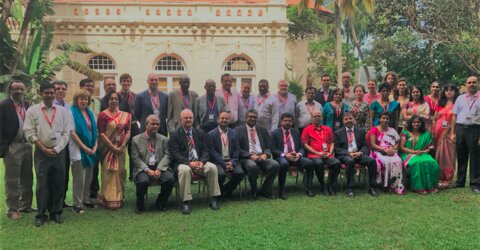Post Kala-azar Dermal Leishmaniasis (PKDL) elimination experts convene in Colombo

International experts gathered in Colombo, Sri Lanka, for the 5th annual meeting of the Post Kala-azar Dermal Leishmaniasis (PKDL) Consortium on 14-16 May 2018.
The meeting brought together policy makers, researchers, and implementors working in the field of visceral leishmaniasis and PKDL to review issues relating to PKDL epidemiology, diagnosis, pathogenesis, clinical presentation, treatment, and control in East Africa and South Asia with a view to strengthening national kala-azar elimination programmes.
PKDL is a neglected complication of visceral leishmaniasis (VL), also known as kala-azar. It manifests itself within months to years after the patient has been treated for VL and is characterized by the occurrence of skin lesions (macules, papules, and nodules) caused by the presence of leishmania parasites and a subsequent immune response. It is thought that the sandfly vector may become infected after feeding on the nodular lesions, and as such, PKDL may play an important role in transmission of VL. In the past, chronic PKDL cases in interepidemic periods have been implicated in the upsurge of epidemics in the Indian subcontinent and in Sudan. There are several epidemiological, clinical, diagnostic, and treatment issues that need to be addressed urgently in order to achieve control of PKDL and, therefore, of VL.
Currently, the role and management of PKDL in the Indian subcontinent is considered a priority as PKDL has been identified as a potent threat to achieving the elimination target of kala-azar and sustaining this. There is therefore an urgent need to describe the approach to PKDL in this context and the Consortium feels there is a need for firm recommendations in alignment with the elimination target.
Joining presenters from across Africa and Asia were London School of Hygiene & Tropical Medicine's Dr Lloyd Chapman who presented his work on quantifying the role of PKDL in transmission of kala-azar, Prof Mary Cameron, who chaired a session on the different work streams of the SPEAK India consortium and Prof Simon Croft, who chaired a panel discussion that sought to define the remaining challenges threatening sustained elimination.
LCNTDR members' Kala-azar/ Leishmaniasis research
Projects
- Setting the Post-Elimination Agenda for Kala-Azar in India (SPEAK India)
- KalaCORE
- Safety and effectiveness of short-course AmBisome in the treatment of Post-Kala-azar Dermal Leishmaniasis (PKDL): a prospective cohort study in Bangladesh
- Design and analysis of clinical trials for the treatment of Visceral Leishmaniasis (VL)
- Mathematical modelling of NTD to support control and elimination
Selected publications
- Variations in visceral leishmaniasis burden, mortality and the pathway to care within Bihar, India
- Elimination of visceral leishmaniasis in the Indian subcontinent: a comparison of predictions from three transmission models
- Safety and effectiveness of short-course AmBisome in the treatment of Post-Kala-azar Dermal Leishmaniasis (PKDL): a prospective cohort study in Bangladesh
- New insights into leishmaniasis in the immunosuppressed
- Understanding the transmission dynamics of Leishmania donovani to provide robust evidence for interventions to eliminate visceral leishmaniasis in Bihar, India